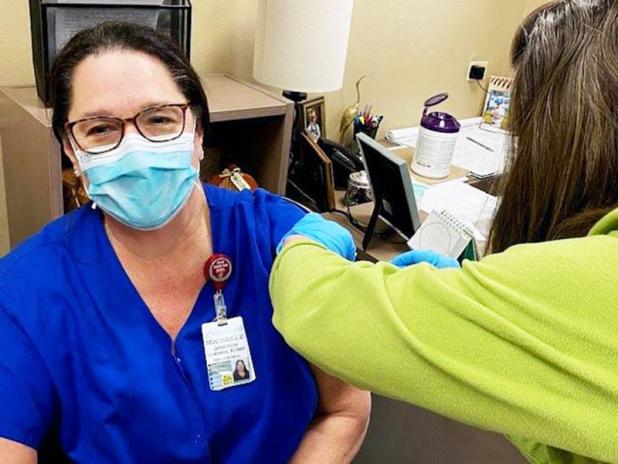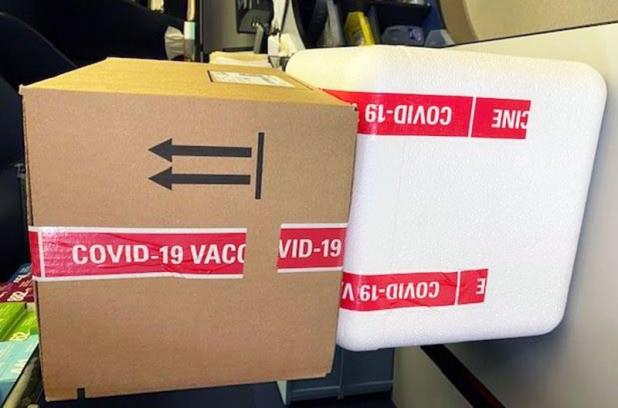
(above) Michelle Glatter, RN, BSN, CIC, Infection Control Preventionist/Employee Health Manager, is the first employee at Abbeville General to receive the COVID-19 vaccine. Administering the vaccine is Heidi Broussard, BSN, BSM?CIC Chief Nursing Officer. Glatter then turned around and gave some hospital employees their vaccine.

The COVID 19 vaccine arrived at Abbeville General in boxes that keep the vaccine below freezing.
Abbeville General employees receive vaccine
Thursday morning, employees at Abbeville General began receiving the COVID-19 vaccine.
It will take the hospital at least two days to use all of the vaccine the hospital received.
Dr. Maria Fontanez, a pediatrician at Abbeville General, was one of the first to take the vaccine on Thursday morning.
“I put my trust in God to spiritually heal me by faith but also by the scientists who have received guidance and knowledge from God to make a vaccine that will stop the Coronavirus Pandemic,” said Fontanez. “I feel blessed and hopeful today as I receive the COVID-19 Vaccine.”
Who gets vaccine first?
Frontline health care workers who are particularly at risk of being exposed to the corona virus, including the roughly 20 million US doctors, nurses, lab technicians, EMT and hospital staff, will be at the top of the list, according to recommendations posted by the Centers for Disease Control and Prevention.
Employees and residents of long-term care facilities like nursing homes should also be part of the first batch of inoculations, according to the guidelines.
8 Things to Know About the
U.S. COVID-19 Vaccination Program
1. The safety of COVID-19 vaccines is a top priority.
The U.S. vaccine safety system ensures that all vaccines are as safe as possible. The CDC has developed a new tool, v-safe, as an additional layer of safety monitoring to increase our ability to rapidly detect any safety issues with COVID-19 vaccines. V-safe is a smartphone-based, after vaccination health checker for people who receive COVID-19 vaccines.
2. COVID-19 vaccination will help protect you from getting COVID-19. Two doses are needed.
You need 2 doses of the currently available COVID-19 vaccine. A second shot 3 weeks after your first shot is needed to get the most protection the vaccine has to offer against this serious disease.
3. Right now, the CDC recommends COVID-19 vaccines be offered to healthcare personnel and residents of long-term care facilities.
Because the current supply of COVID-19 vaccines in the United States is limited, the CDC recommends that initial supplies of COVID-19 vaccines be offered to healthcare personnel and long-term care facility residents. According to Michelle Glatter, RN, Infection Control Preventionist at Abbeville General, “We are currently in the process of vaccinating the healthcare workers at the hospital. We received our first shipment of 75 vaccines yesterday and began vaccinating our workers on a voluntary basis. By the end of the day on Friday, we will have exhausted this supply. We are scheduled to receive a second shipment on Monday, and will continue the vaccination process.”
4. There is currently a limited supply of COVID-19 vaccine in the U.S., but the supply will increase in the weeks and months to come.
The goal is for everyone to be able to easily get vaccinated against COVID-19 as soon as large enough quantities are available. Once the vaccine is widely available, the plan is to have several thousand vaccination providers offering COVID-19 vaccines in doctor’s offices, retail pharmacies, hospitals, and federally qualified health centers.
Glatter states, “Vaccines should be available to the public in 2-3 months. We at Abbeville General encourage everyone to consider taking this vaccine to help stop this pandemic.”
5. After the COVID-19 vaccination, you may have some side effects. This is a normal sign that your body is building protection.
The side effects from the COVID-19 vaccination may feel like flu and might even affect your ability to do daily activities, but they should go away in a few days.
6. The cost is not an obstacle to getting vaccinated against COVID-19.
Vaccine doses are purchased with U.S. taxpayer dollars and will be given to the American people at no cost. However, vaccination providers may be able to charge administration fees for giving the shot. Vaccination providers can get this fee reimbursed by the patient’s public or private insurance company or, for uninsured patients, by the Health Resources and Services Administration’s Provider Relief Fund.
7. The first COVID-19 vaccine is being used under an Emergency Use Authorization (EUA) from the U.S. Food and Drug Administration (FDA). Many other vaccines are still being developed and tested.
8. COVID-19 vaccines are one of many important tools to help us stop this pandemic.
It’s important for everyone to continue using all the tools available to help stop this pandemic as we learn more about how COVID-19 vaccines work in real-world conditions. “Cover your mouth and nose with a mask when around others, stay at least 6 feet away from others, avoid crowds, and wash your hands often,” encourages Michelle Glatter.
This information is provided by the Centers for Disease Control, Dec. 13, 2020.
QUOTE FROM: Maria Fontanez, MD, Pediatrician at AGH
“I put my trust in God to spiritually heal me by faith but also by the scientists who have received guidance and knowledge from God to make a vaccine that will stop the Coronavirus Pandemic. I feel blessed and hopeful today as I receive the COVID-19 Vaccine.”
